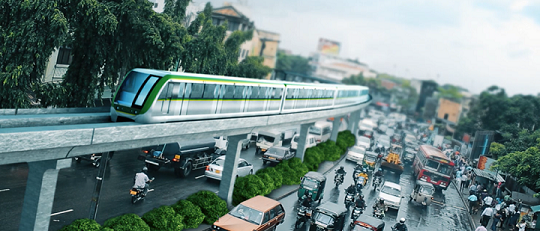- Home
- News & Features
- News
- FY2019
- March 8 is International Women's Day: Enhancing women's participation in society by improving safe transportation
News
March 6, 2020
March 8 is International Women's Day: Enhancing women's participation in society by improving safe transportation
Mar. 8 is International Women's Day to reflect on progress made, and to call for change to promote women's social participation. Remarkable achievements have been made across nations, however, a variety of obstacles still prevent women from participating in society. A report issued by the International Labour Organization (ILO) in 2017 noted that the most significant factor constraining women's participation in the workforce is “lack of transportation in developing countries.”
 Women drivers on the Delhi Metro
Women drivers on the Delhi Metro
In order to improve this situation, JICA has implemented initiatives in developing countries such as India to incorporate a gender perspective in infrastructure development.
Integrating a gender perspective into infrastructure development
The Government of Sri Lanka and JICA signed an ODA loan agreement for the “Project for Establishment of a Light Rail Transit System in Colombo” in March 2019. This project will construct an LRT (Light Rail Transit) system connecting the central area of Colombo and the suburbs with 16 stations along 15.7 kilometers of elevated track. Construction will begin in 2021 and is scheduled to be completed in 2025.
The Ministry of Urban Development, Water Supply & Housing, which implements the project, is currently working with JICA to formulate a Gender Action Plan (GAP) in order to incorporate a gender perspective in the Project. The GAP summarizes the planned initiatives and actions for design of stations and rolling stock, construction, and operation that need to be implemented from a gender perspective.
 The Light Rail Transit System in Colombo, Sri Lanka (image)
The Light Rail Transit System in Colombo, Sri Lanka (image)
For stations, initiatives include the installation of separate washrooms for men and women, adequate lighting, emergency alarms, CCTV cameras, and separate ticket counters for men and women, and the deployment of male and female security guards. For rolling stocks, initiatives include the installation of priority seats for persons with disabilities, women, children, and the elderly, and the installation of CCTV cameras.
In terms of construction, initiatives include the employment of women for construction work, provision of facilities for women at construction sites, and equal pay for equal work. For operations, initiatives will include the hire of women drivers and conductors, the setting of fares and timetables that take into account women’s needs, the deployment of female staff at ticket offices and ticket gates, and awareness campaigns to prevent sexual harassment.
Impact on women's participation in Sri Lanka
 Chaminda Ariyadasa, project director of the
Chaminda Ariyadasa, project director of the
Project for Establishment of Light Rail Transit System in Colombo
(photo/ The Japan Journal)
“Women’s participation in construction and public transport is low in Sri Lanka. For example, public transport such as buses and trains do not have any female driver,” says Chaminda Ariyadasa, project director, The Ministry of Urban Development, Water Supply & Housing. “That's why we believe this project will be a benchmark for gender mainstreaming in Sri Lanka.”
In addition to assisting in the formulation of the GAP, JICA is helping raise awareness among stakeholders by dispatching experts to Sri Lanka. The project assists to hold seminars and workshops on gender for staff from the organizations implementing the initiatives and other stakeholders.
“I think this project will have a significant impact on Sri Lanka’s industry. When young women see women working as drivers and engineers on the new LRT, it will be a great stimulus for women’s participation in society,” says Ariyadasa. “The project will also send a good message to the entire public transport sector in Sri Lanka regarding women’s participation.”
Safe transportation expands women’s economic participation
One of the reasons why the gender perspective is important in the arena of infrastructure, aside from the promotion of gender equality and women’s empowerment, is its impact on economic growth. According to a 2015 estimate by the McKinsey Global Institute in the United States, expanding women’s economic participation to the same level as that of men would increase GDP to 26% ($28 trillion) by 2025.
“Women in developing countries are vulnerable on public transport to harassment and gender-based violence. Lack of safe transportation greatly limits female participation in the workforce and in society more broadly,” says Kamei Haruko, Senior Director, JICA’s Office for Gender Equality and Poverty Reduction. “If women are guaranteed safe transportation, their participation in economic activities will increase, which in turn leads to economic growth.”
One JICA project that incorporates a gender perspective is the development of the Delhi Metro in India. Women-only cars were introduced on each line in 2010, with seats also reserved for women in all other cars. Escalators are equipped with “sari guard” brushes to prevent the hems of women’s saris from getting caught. In the Delhi Metro, women-friendly transportation is encouraging women’s participation in the workforce.
 left:
left:
Men and women workers at the launch of a new train service on the Delhi Metro in India, December 2016
right:
Escalators equipped with “sari guard” brushes on the Delhi Metro
“Japan has made various efforts to change gender stereotypes in urban transportation and elsewhere in the infrastructure sector. We would like to harness this experience when considering assistance in developing countries,” says Kamei. “JICA would like to improve the quality of all projects in transport and other infrastructure in order to achieve gender equality.”
Related Links
- About JICA
- News & Features
- Countries & Regions
- Our Work
- Thematic Issues
- Types of Assistance
- Partnerships with Other Development Partners
- Climate Change / Environmental and Social Considerations
- Evaluations
- Compliance and Anti-corruption
- Science and Technology Cooperation on Global Issues
- Research
- JICA Development Studies Program / JICA Chair
- Support for the Acceptance of Foreign HRs / Multicultural and Inclusive Community
- Publications
- Investor Relations





